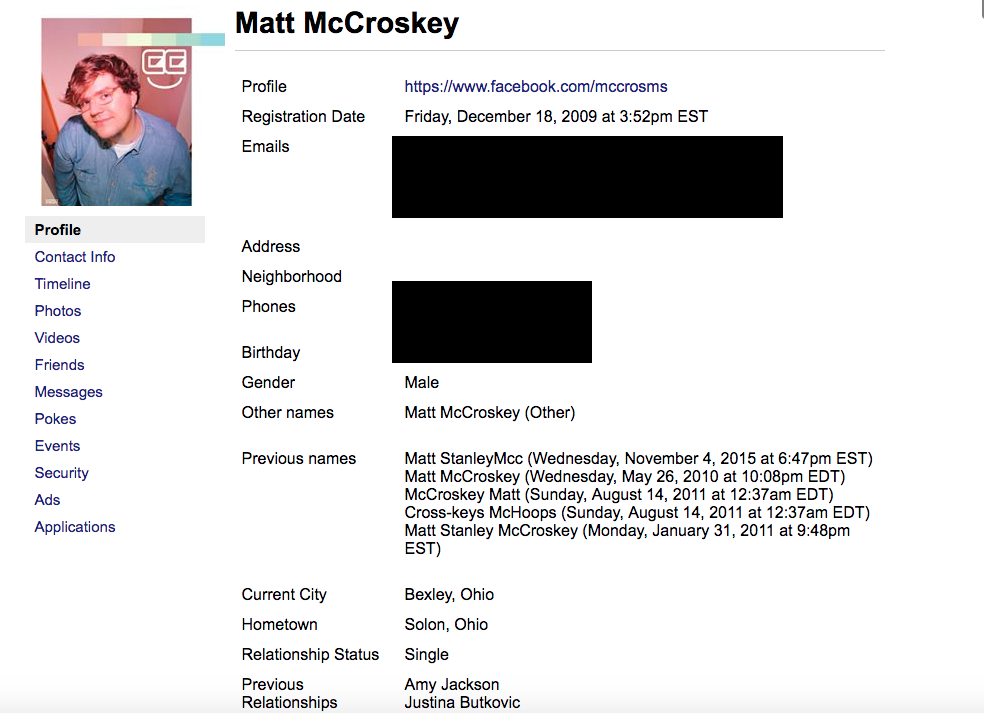A few weeks ago, it was reported that data firm Cambridge Analytica had gained access to tens of millions of Facebook users’ private data without permission, which they used to orchestrate and run Donald Trump’s 2016 election campaign. Since then, attitudes toward Facebook and the data they collect have been incredibly hostile, leading many people to try to boycott the world’s largest social media website.
However, even if you were to abandon Facebook, there is still a treasure trove of data associated with your account still on file. I’ve seen countless stories of people accessing their own archive and seeing that Facebook has everything from group messages to even Android devices’ phone call and text message logs stored underneath their name.
As someone who’s gone completely numb to how much data social media companies, advertisers and the government have stored about me, I decided it’s probably a smart wake up call to download some social media archives and see what dirt on me these people have access to.
I’ve been mildly familiar with Facebook’s privacy policy and the fact that you have the ability to download your complete facebook archive for years now. However, it’s also worth noting that many other tech companies, such as Twitter and Snapchat, allow you to download data archives that include some of the data they collect as well. So, for the sake of journalism and potentially reliving parts of my life I never want to visit anymore, I downloaded my archives from all three sites.
One warning if you choose to do the same, regardless of the archive you download: keep this file in a secure place, don’t send it or put it anywhere publicly, and maybe even delete it after you take a look through it. When you download data like this, it makes it even easier for people to access all the personal data you don’t want public.
I’ll be going through these data archives in the order that they’re available to download for me. When you submit your data request, it usually takes a few minutes for the archive to get ready. The size of the archive widely varies based on the service.

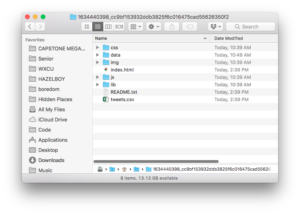
In the archive, it’s essentially just a long spreadsheet of all your tweets alongside a handy .html file to explore everything in an offline website. Beyond going back to 2013 and cringing at how I tweeted (it’s nothing really bad, just me being a senior in high school), there’s nothing that scary included in this archive. Also, the archive does not include direct messages.
However, probably the saddest part of the archive is that the .html file includes a graph of how much you’ve tweeted each month. Based on this, I realized this past December was my most-tweeted month throughout my account’s four years of existence, during which my fingers cranked out a total of 812 golden tweets. I clearly have a life!
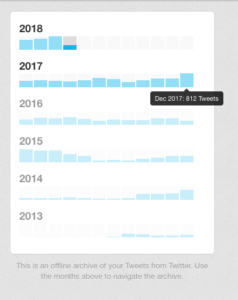
Beyond this, one may use the .csv of the archive in excel to search for keywords in tweets you don’t want to be public anymore, just so you don’t have one of those embarrassing situations when you’re famous or something and someone finds a horrible tweet from back in the day. I wasn’t able to find much on what they consider data to send to advertisers, but since my account is public, literally any advertiser, government agency or Nardwar-style interviewer could find it all pretty easily.
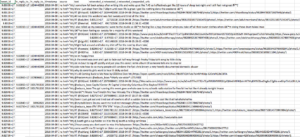

Snapchat
While it’s pretty common knowledge that most of your snaps stay on their servers after someone views them, no private snaps appear in the archive. Instead, it only lists a log of communications on Snapchat and other accounts that only goes back about 3 or so weeks (for me).
It does include an archive of images and videos you’ve submitted to either public stories or the themed “our story” collective public snap stories (like this gem I took before finals week last year).

However, Snapchat’s archive starts to dive into showing how much weird data social media sites have on you and openly share with advertisers and other groups. When you go to the “user profile” part of your archive, it not only shows some basic data on your account, but also shows what you engage with on Snapchat and explicitly how you interact with very specific ads.
One of the weirdest sections of this part is where it lists what sort of “Interest Categories” you apparently belong to. According to Snapchat, I’m a “Retail Store Visitor”; “Do-It-Yourselfer”; Burger, Coffee, and Pizza Lover; and a Sneakerhead who goes to Movie Theaters and Big Box Stores like Walmart. Additionally, they think I’m an “Art and Culture Maven”; a Cycling, Automotive and Yoga Enthusiast; a Fast Food Junkie (true) and a “Home Decorista.”
In terms of music, they know I am a fan who goes to concerts and is into dance and electronic, indie, alternative and pop music. I’m also, I guess, a member of the “Clubbers & Party People” crowd, a fan of the Olympics and somehow an automotive shopper. Who knew?!
On the bright side, it doesn’t appear that they store much location information other than the city you tend to reside in the most.

Out of the three services I explored, Facebook’s archive was the largest, mostly because I’ve been on the site the longest. I joined in December of 2009 and have been relentlessly posting and making it a part of my digital and real life since then. This archive, as a .zip file, was a whopping 3.3 GB in size, which took over an hour to download on Capital’s wi-fi.
Unzipped, this archive spans my eight-year history on the site and includes substantially more data than either of the previous archives. Facebook stores not only all of your posts, but also every message and group message you’ve ever been a part of. Using their well-organized .html file, you can peruse around this offline profile to relive the past much faster and more hard-hitting than with Facebook’s “Memory” feature they added a few years ago.
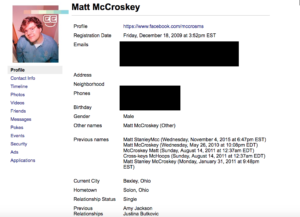
You’re first greeted by a summary of your profile. This includes some of the obvious, including your name, emails and phone numbers associated with your account, likes and locations. Beyond that, it does get kind of weird.
First, it lists every single name you’ve used as your Facebook profile name since your account was created (including when I thought it was funny to change my name to “Cross Keys McHoops” in summer 2011). Additional pain comes into play when it lists every single person you’ve been in a “Facebook official” relationship with, including the girl who added me as her fiance as a joke during, like, freshman year of high school (I haven’t talked to her at all since graduating). Beyond the obnoxiously long list of band and music Facebook pages I liked, nothing else was surprising here.
Up next, Facebook shows you your “Contact Info” page. This one really made me feel weird. I guess if you ever sync your phone’s contacts with Facebook when you download the app, it adds every single phone number stored in your phone to Facebook, which is kind of unsettling. I’m not sure if they use this data for anything, but it’s data that they collect and store.
Next, it’s the timeline. I didn’t really spend too much time here because I post a lot, but this is the most obvious data they collect here. If it’s worth noting, trying to scroll through this page of eight years of mediocre posts almost caused me to crash my browser.
The one really useful thing the archive offers is an easy way to download every photo or video you’ve posted on Facebook, regardless of which page/group you posted on. I found some really old gems, like this one dog I spotted in summer 2016 while on a run in Chillicothe, Ohio, and two years of celebrating my friend’s birthday by making a photo of him my desktop background. There were also some old concert videos from my friend’s band in high school and a facebook live archive of some other live concert gems from, like, two years ago at a WXCU show.
Next, we’ve got “Friends.” This archive page is weird because, beyond the list of your current friends that are listed in chronological order of you adding them, they also store the friend requests you’ve declined, friend requests you’ve sent that no one responded to (or declined), friends you’ve removed and public people you still follow. It’s a weird trip down memory lane that re-ignites old grudges when I see I tried to friend Dom McLennon from BROCKHAMPTON back in August (we at least have mutual friends), alongside a slew of music producers, designers, and other “internet influencers” back from the “weird facebook movement” in 2014-2015.
In addition to seeing every single person you’ve poked, all the stupid events you’ve hosted, a list and IP address of every device you’ve accessed your Facebook off of, and every weird Facebook app you’ve used to see what Disney/Pixar Character you are, you also get to two very sinister sections: “Ads” and “Messages.”
On the “Ads” page, it shows how Facebook categorizes you when people use targeted advertising to promote their product/service. These mostly stem from your likes on Facebook, but also include some targets I wasn’t aware of like “Puberty,” “Livestock,” “Gardening,” “Human Sexuality,” and “Foot.” It also lists an archive of every single ad you’ve interacted with for the past few months, and eerily enough, shows a LONG list of advertisers and pages that have access to your contact info through Facebook, very much likely without your direct, explicit or conscious consent.
Some advertisers who have my email in a spreadsheet somewhere include BROCKHAMPTON, Ansel Elgort and (I have no clue how they got my info) 17 individual state chapters of a Conservative, Libertarian, Koch Brothers-funded political advocacy group called “Americans for Prosperity” (Who ironically enough worked to block the construction of a Facebook data center in Utah in 2016).
Besides all this detailed information on advertisers who openly have access to your contact information, one of the most shockingly detailed parts of the archive is the “messages” section. This allows you to access every single message you’ve ever sent to someone on Facebook, even if it’s one of those weird, annoying “you’re connected with x person on messenger” messages.
Beyond the ability to quickly scroll through the text parts of conversations you had with your ex over the three years of knowing each other, Facebook stores every single picture, gif, video, audio, sticker, and any other file sent over messenger in your archive.
I didn’t realize how in-depth this went until some shockingly obscene images that were sent to me in a group chat I was a part of in 2015 showed up in this file directory. I remembered afterward that back in the day it was bad enough to the point I had to wait to check the chat until I was alone in fear of accidentally having some random person’s crotch or “[insert x cartoon] Rule 34 google image result” in full view when I was at work. And now Mark Zuckerberg associates every pic from that chat with MY PURE NAME! YEESH!
On the bright side, it’s an easy way to access Facebook stickers for use elsewhere beyond Facebook. But that’s an extremely ambivalent bright side to how much of your personal data these websites have on you.
While it is incredibly easy to become numb to oversharing information on social media (and secondhandedly to advertisers and law enforcement agencies), taking time to really assess what dirt these companies have on you can help you make smarter choices on sharing information in the future.
Or you could just post more poop tier memes like this one from the infamous aforementioned group chat. Your call.


